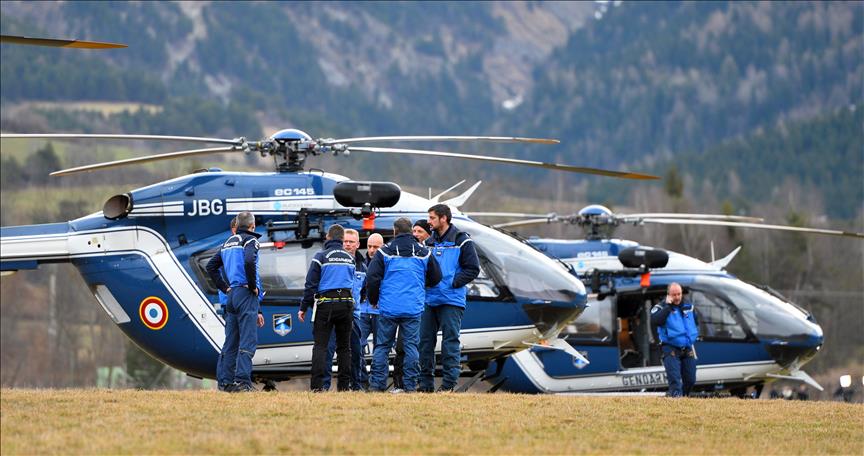Germanwings: France, Germany adopt new safety measures
Air passengers in Europe could face stricter ID checks before boarding within Schengen region under new measures after crash of flight 4U 9525.

BERLIN
French and German airlines are introducing new security measures in the wake of last week's Germanwings plane crash in southern France in which 150 people died.
Alexandre de Juniac, the CEO of Air France, said on Thursday the French flag carrier had already adopted a proposed rule requiring the presence of two crew members in the cockpit at all times.
He told a press conference in Lyon: "We have applied the measure since yesterday morning on all our flights.
"We wanted to take some time to reason before implementing the rule."
In Germany, Bild daily reported possible measures being considered included changing the cockpit door locking system on passenger planes, as well as imposing stricter ID checks on travellers before they board flights within the Schengen free-movement zone.
There are currently no passport controls for passengers travelling within the Schengen region, which encompasses 22 of 28 EU member countries.
Airlines are also not required to check ID’s of passengers before boarding flights within the Schengen.
German Interior Minister Thomas De Maizere told Bild daily that the Germanwings plane crash had shown the current practice was posing a serious security problem, and disclosed that they were examining the possibility of imposing compulsory ID checks on passengers.
Security concerns
De Maizere said that soon after the crash of Germanwings plane, they wanted to examine the possibility of a terror attack but were not able to immediately identify the passengers and crew on board, due to a lack of strict ID checks before the flight, which was from Spain to Germany, both part of the Schengen free-movement zone.
He said: "That’s a huge security problem and we have to seriously consider whether this practice can continue like that in future.
"Travelling by plane is not comparable to traveling by train or bus, in which one can anonymously get tickets."
"In my opinion, due to the security concerns, we have to exactly know who is on board," he said.
The lack of rules for compulsory ID checks before boarding flights within the Schengen region have created loopholes, with some passengers traveling or using tickets purchased in other people’s names.
Door locking system
Bild also reported discussions were taking place on changing the cockpit door locking system in Airbus planes, which was introduced after the 9/11 terror attacks on the U.S.
The cockpit door of Airbus planes was re-designed after the attacks to prevent any unauthorized entry to the cockpit and it could only be locked or unlocked from within.
But the rule apparently worked against the safety of the passengers on the crashed Germanwings plane, where co-pilot Andreas Lubitz is thought to have intentionally kept the pilot outside the cockpit using the mechanism minutes after the pilot had left to go to the toilet, and then taken the plane into a dive.
The examination of the black box voice recorder revealed the pilot could not re-enter the cockpit, despite making several attempts, before the crash.
Bild reported that a team of German and French experts were evaluating the possibility of enabling authorized personnel to enter the cockpit in emergency situations.
Motives unclear
The motives of the 27-year-old Lubitz, who is believed to deliberately flown Germanwings flight 4U 9525 into mountains in southern France, remain unclear.
Police had found several medical certificates at the house of the co-pilot last week, showing that he was not capable of working on the day of the tragedy.
Lubitz was undergoing medical treatment for severe depression, but he had kept the fact secret from his employers, according to the documents.
Bild daily reported on Thursday day that the co-pilot was using several drugs, including an antidepressant, and another drug called Lorazepam, which had calming effect and also used as sleeping pill.
The daily claimed that Lubitz was also receiving treatment for eye vision problems, since he was involved in an accident by his car in late 2014.
Germany’s largest airline Lufthansa, which owns low-budget Germanwings, claimed last week that Lubitz was “100 percent fit to fly without any restrictions”.
But the company confirmed in a written statement on Tuesday that an internal investigation revealed that Lubitz had informed the company in 2009 about his medical treatment for a “previous episode of severe depression.”
Deadly crash
The Germanwings Airbus 320 was en route from Barcelona, Spain, to Dusseldorf in Germany, when it went down on March 24, killing 144 passengers and six crew members on board.
The majority of the victims were German and Spanish.
The air disaster is one of the most tragic incidents in recent German aviation history and the first deadly crash of a Germanwings plane since the low-budget airline was founded by Lufthansa in 2002.
The crash was also the first on French soil since July 25, 2000, when an Air France Concorde crashed into a hotel in Gonesse in the Val-d'Oise, shortly after taking off from Roissy-CDG Airport, killing 13 German passengers and crew members, along with four others on the ground.
Anadolu Agency website contains only a portion of the news stories offered to subscribers in the AA News Broadcasting System (HAS), and in summarized form. Please contact us for subscription options.

